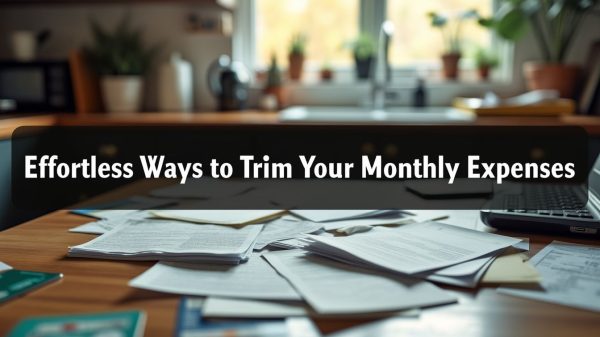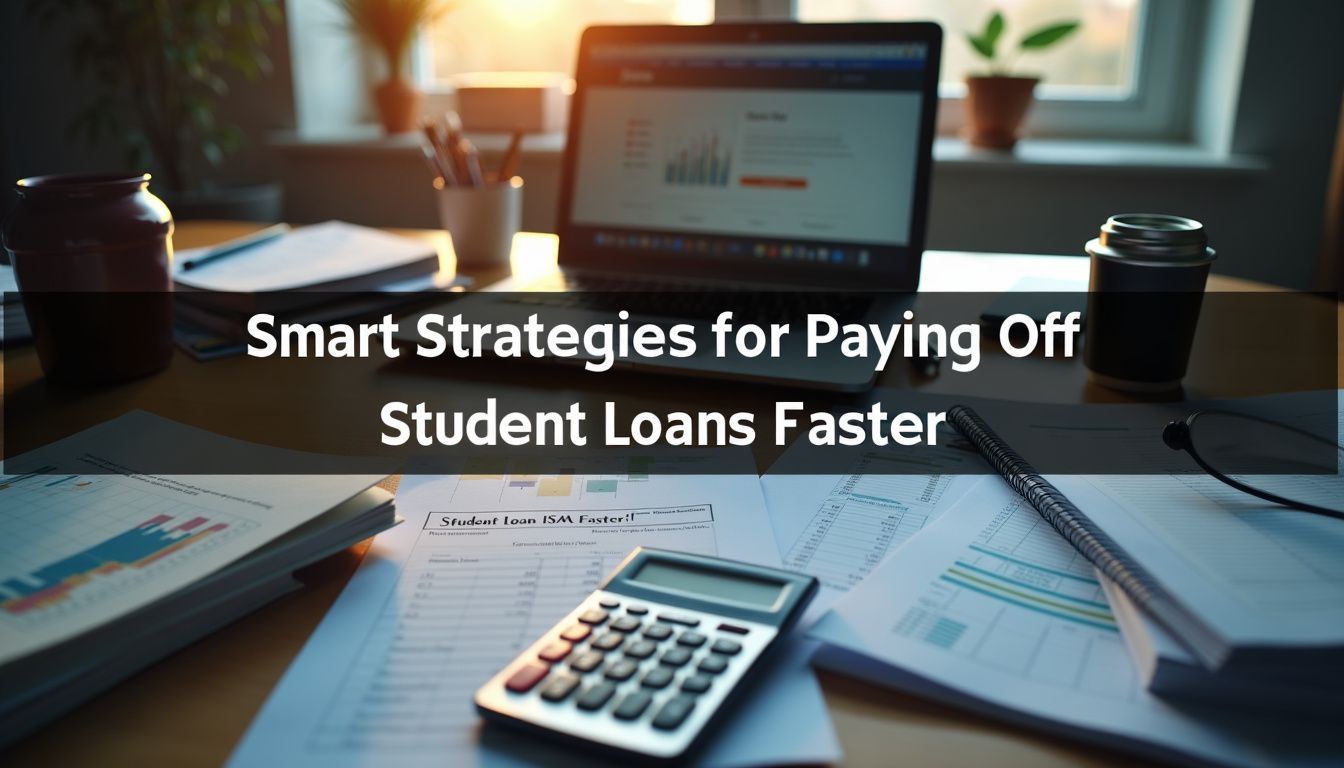Paying off student loans can be overwhelming. Over 44 million Americans struggle with student loan debt. This article will provide you with smart strategies to pay off your student loans faster, from making extra payments to refinancing and more.
By the end of this article, you’ll be one step closer to financial freedom.
Key Takeaways
- Making extra payments toward the principal can save you thousands of dollars in interest. For example, a $10,000 loan at 4.5% interest can be paid off 5.5 years sooner by paying $100 extra each month.
- Refinancing your student loans can reduce your monthly payments by changing to a new loan plan with a private lender. A good credit score and strong income are needed for refinancing. For instance, refinancing a $50,000 loan over a 7-year period can save approximately $15,000.
- Using “found” money, such as tax refunds or bonuses, to make lump-sum payments can reduce the overall interest you pay. For example, paying $400 instead of $288 per month on a $25,000 loan at 6.8% interest can finish paying in under seven years.
Make Extra Payments Toward the Principal

Making extra payments toward the principal can save you thousands of dollars in interest. A $10,000 loan at 4.5% interest can be paid off 5.5 years sooner by paying $100 extra each month.
To make extra payments, check your loan balance and interest rate. Increase your monthly payment by a fixed amount each month. This can be $50, $100, or any amount you can afford.
You can also make lump sum payments. If you get a tax refund or bonus, put it toward your loan. This can reduce your loan balance fast. Some loans have interest rate discounts for making extra payments.
Check with your lender to see if this is an option.
To make extra payments, you can use the debt snowball method or debt avalanche method. The debt snowball method involves paying off loans with the smallest balances first. The debt avalanche method involves paying off loans with the highest interest rates first.
Refinance Your Student Loans
You can reduce your monthly payments by refinancing your student loans. A lower interest rate helps you save money. When refinancing, you change to a new loan plan with a private lender.
You need a good credit score and strong income for refinancing. Your total debts should also be half or less than your earnings. For instance, change from 8.5% to 6%. Refinancing a $50,000.00 loan, over a 7 year period: approximately $15,000 is saved.
While about $87 is incremented monthly. This is on private student loans. When your credit card is a part of these debts – a line of credit not needed for spending. Make sure debts from this refinanced account are covered.
After changing your account, always plan. Plan to invest money from account changes always to prevent huge debt with little credit scores. But there are a few warnings for refinancing federal debts with this line of work or business for the young to help keep them above this financial pool.
Student Loan Forgiveness Programs usually aren’t possible after converting private loans using this debt approach. So you choose one – with the private refinancing student loans’ benefit and another – still sticking to other federal credit offers, when you pick another choice between the normal 50K refinances debt line – federal – on student and parent + plus loan in this method as an effective approach at student debt settlement.
After paying these heavy amounts regularly or by taking the final credit decision between an offer: between your family’s – good student forgiveness programs then at times after a thorough approach or method at saving by not a credit loss than just using a saving’s credit option for refinance, these refinancers don’t forget to start on time!
https://www.youtube.com/watch?v=HFCF7X-mqoA
Enroll in Automatic Payments
Enrolling in automatic payments is a smart move. It helps you pay on time. You avoid missed payments. This can also lower your interest rate. Many lenders give a 0.25% discount for autopay.
A $10,000 loan is a good example. Automatic payments can save you $144 over 10 years. That’s money you can keep in your pocket. Plus, autopay is a hands-off way to pay. You set it and forget it.
Federal student loan servicers offer autopay too. They may give you a discount on your interest rate. Ask your servicer about this perk. It’s a simple way to save money on your loan.
Make Biweekly Payments
You pay your student loans every month. Try paying every two weeks instead. This is called a biweekly payment. You will make 26 payments in a year. This is like making one extra payment per year.
Paying biweekly can save you money. You will pay less interest over time. This can also help you pay off your loans faster. Use a biweekly student loan payment calculator to see how much you can save.
Biweekly payments can be a good option for some people. You should check your budget first. Make sure you can afford to make extra payments. If you can, biweekly payments might be a good choice for you.
Pay Off Capitalized Interest
Capitalized interest is added to your loan balance when interest accrues during periods of deferment or forbearance. This can happen before you start repaying your student loans. For example, a $10,000 loan at 3.65% interest rate accrues $365 in interest by the start of repayment.
Paying off capitalized interest saves you money in the long run. It reduces your principal balance, which means you pay less interest over time. Make extra payments toward the principal to pay off capitalized interest.
You can also refinance your student loans to lower your interest rate and reduce the amount of interest you owe.
Use ‘Found’ Money Wisely
You get money sometimes. This is called “found” money. It can be a tax refund or a bonus. Use this money to pay your student loans. You can make a big payment with it. This will help you pay less interest.
Let’s look at an example. You have a $25,000 loan at 6.8% interest. You pay $288 each month. If you pay $400 instead, you can finish paying in under seven years. That’s fast! You save money on interest too.
You can also use “found” money for a big payment. This is called a lump-sum payment. It can reduce the overall interest you pay. That’s a smart move. Try to use your “found” money wisely.
It can help you pay off your student loans faster. Paying off your loans fast is a great feeling! Adding a side hustle can get you more “found” money. You can use this money to pay off your loans.
Apply for Loan Forgiveness Programs
Federal student loans can be a heavy burden. The government offers loan forgiveness programs to help ease this burden. These programs forgive part or all of your loan balance. You must meet certain requirements to qualify.
Public Service Loan Forgiveness (PSLF) is one such program. It forgives your remaining balance after 120 qualifying payments. You must work in a government or nonprofit job to qualify.
The Teacher Loan Forgiveness Program is another option. It provides up to $17,500 in forgiveness for teachers in low-income schools. You must teach for five years to qualify.
The SAVE Plan is a new income-driven repayment plan. It offers forgiveness after 20 years for undergraduates and 25 years for graduates. Your monthly payment will be based on your income.
This can make it easier to pay your loans and qualify for forgiveness.
Leverage Tax Deductions and Credits
Tax deductions can save you money. Student loan interest can be deducted up to $2,500. This is good news for people paying off student loans. To be eligible, you must pay interest on a qualified student loan in the tax year 2023.
Your lender will send you Form 1098-E if you paid $600 or more in interest.
You can claim this deduction on your tax return. It is a good idea to keep track of your interest payments. You can use a spreadsheet or a budgeting app to do this. Some employers also offer repayment assistance programs.
These programs can help you pay off your student loans faster. You can also use tax credits to reduce your tax bill.
Conclusion
Paying off student loans can feel like running a marathon. You can see the finish line, but it’s far away. Use these smart strategies to speed up your loan repayment. Make extra payments, refinance, and use “found” money wisely.
You will cross that finish line faster.
References
- https://www.wsj.com/buyside/personal-finance/student-loans/pay-off-student-loans
- https://www.nerdwallet.com/article/loans/student-loans/pay-off-student-loans-fast (2024-06-21)
- https://studentaid.gov/articles/pay-off-student-loans-faster/
- https://www.vectrabank.com/personal/community/two-cents-blog/7-Smart-Strategies-for-Paying-Off-Student-Loans/
- https://www.investopedia.com/how-to-pay-off-student-loans-fast-7368721
- https://www.colorado.edu/asmagazine/2021/06/04/researchers-find-optimal-way-pay-student-loans
- https://www.cnet.com/personal-finance/loans/student-loans/is-paying-off-your-student-loan-debt-early-a-smart-financial-move/
- https://studentaid.gov/articles/student-loan-forgiveness/
- https://www.ncbi.nlm.nih.gov/pmc/articles/PMC5821025/
- https://www.irs.gov/taxtopics/tc456
- https://www.wsj.com/buyside/personal-finance/student-loans/pay-off-student-loans?mod=googlenewsfeed






